Farm Spotter: 2016 What’s the Big Idea Competition
By Douglas McDaniel, CTO, Farmspotter
It was a cold night in December 2015, and I was heading out of town on business, but first meeting my friend Jason Hanna for a quick chat at Knox Public House over on Magnolia. I had previously directed and produced a music video for Jason’s band, Dixieghost, which we shot at Atlanta’s infamous Clermont Lounge, and Jason and members of his band had also scored the music for my second documentary film, Legends of Appalachia: The Ace Miller Story. We’re more than friends. We’re serial collaborators.
It was Jason’s off-season from selling produce for Spencer Mountain Farms, a Mennonite Community in Pikeville, Tennessee, and over drinks, we turned to the subject of how to grow that business. He had beets and sweet potatoes in his beater Ford Explorer with a bumper sticker that read, “I Love My Mountains,” and a transmission that had no reverse. That’s Jason in a nutshell. No reverse. Full throttle ahead. And loyal as heck to his mountain roots.
I suggested to Jason that he apply some principles of the sharing economy, like Airbnb or Uber to his business. My wife, Faith McDaniel and I had become very successful with Airbnb. Unlike most Airbnbs in Knoxville, we had gone through the legal process to get our Marble Hill Inn zoned as a bed and breakfast, and we were doing very well with it.
As we literally sketched ideas on a beverage napkin, we noted the supply chain problems inherent in connecting local producers to local buyers or customers, primarily restaurants and grocery stores.
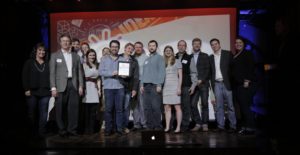
What’s The Big Idea?
A day or so later, we had a business model that we thought might have some legs. Jason checked in with his friend Jonathan Sexton at the Knoxville Entrepreneurial Center, and Jonathan encouraged him to enter the 2016 What’s the Big Idea Competition.
Jason came back to me excited, and asked if I would come onboard with him and do the competition in February, not really knowing what to expect. There were over 50 teams competing, and I was skeptical that we would even make it to the finals. But together, we poured over the application, answered honestly, and pulled together a bunch of market data: Did you know that 40% of local produce never gets sold? Never makes it to market?
Jason was certain we could compete in this competition. Fast forward a few weeks, and I was dumbfounded when we were selected as one of six finalist teams scheduled to compete in February. Jason just laughed his infectious laugh and smiled broadly.
It was on.
How it Works
Here’s how the weekend went. We hope you’ll find some of this useful if you think about entering the competition.
On Friday night, you pitch your idea to a group of volunteer mentors. This is the biggest opportunity you have to make a good impression, and to surround yourself with people smarter than yourself. You’ll find software developers, marketing professionals, attorneys, CPAs, and financial analysts. Jason and I chose to co-present our pitch. This was not necessarily the best idea. We did ok, bouncing back and forth and engaging the audience, but some felt it would have been easier to focus on one presenter, which is what we decided to do for the finale presentation on Sunday night at Scruffy City Hall.
We were engaged by some great mentors, primarily an entire team of mentors from Master Dry, including their CEO, Josh Smith. For the next four hours on Friday night, our mentors challenged our every assertion. We had come into the weekend with a model that was really two conflicting models: an online marketplace AND a local produce distribution system complete with refrigerated storage and a vehicle fleet.
Our mentors quickly helped us realize through cost modeling that one of these models was just not viable. We had to regroup. Our team of mentors retired for the evening, leaving us to scratch our heads and digest the whirlwind we had just passed through. It was not a happy moment. More importantly than even losing the weekend competition, we were no longer convinced of the business itself.
Talk to Your Customers
After we wrapped Friday night, Jason and I grabbed a bite at Blue Coast Grill, just down from the KEC, to lick our wounds. Blue Coast prides itself in local produce. So we put aside everything we thought, and as we had learned through the KEC, we needed to talk to the customer. So that very night, we casually asked one of their managers, Jared Lane, some questions about supply and demand for local produce, the inventory issues that push restaurants to forego local farmers and push toward mid-level distributors, and how to hone in on the opportunity space to get more farmers in front of restaurants like theirs.
We went back to our world headquarters (my house) after we ate, and immediately got back to work. One of the most valuable things about the What’s the Big Idea Competition is the tools you learn to model a business, starting with the basics of identifying the problem story of your customer. It can be boiled down into several bullet points, or told with a visual, but you have to know what problem your business is solving. Losing sight of that can cause you to shift your focus into unproductive areas of your business. That’s a lesson we have continued to learn this year since the competition. But that’s another story for another day.
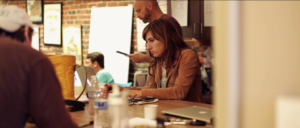
Collaborate, Listen, and Learn
Saturday: the longest day of our lives. Our mentors were there for us all, day, from early to late. They wanted to know early in the morning where we were, what was our new business model. We had to pitch them again with our overnight work, informally this time, but still, we knew we couldn’t BS anyone. It worked. They believed us. We convinced them that we might just have something here. More importantly, we believed us.
That day, we re-branded the company…literally re-named it. Twice. The original name was Farm2Table. The new name, arrived at by committee decision with our mentors, was FarmFoodtoYou or something like that.
We had a mentor working on the logo, while Jason poured over financials with the business guys from Master Dry. Other mentors defined software requirements and began prototyping our web app. We decided against mobile, choosing responsive web instead. We had several killer mentors from Code Tank Labs—who were helping several teams by the way—and they absolutely killed the UI, using CSS to build an elegant front end that supported the branding we had established with some of the other mentors.
The requirements analysis alone was one of the biggest valuable takeaways from the weekend. It would drive our software development for the rest of the year, in ways good and bad. We’ll talk about overbuilding vs. a true minimum viable product (MVP) another time.
I was trying to keep up, documenting where we were going with other mentors who were helping me put the skeleton of our pitch presentation together. Jason and the Mentors (is that a band name?) decided I would do the pitch for the Sunday night finale. Thanks, buddy!
The entire weekend, we talked over each other. Interrupted. Finished each other’s sentences. Solved challenging problems. The energy in the room was incredible. We’d offer advice to the other teams we were competing against—very, very talented teams. Some really smart people in this room. We’d get advice from other teams. We laughed. Jason and I would argue. He knew farmers. I knew software. We ate pizza and drank coffee by the gallon. The room gets loud. Don’t let it overwhelm you. Put your business teams to work, and if they need to find a quiet place to work, there are plenty of places around the square to huddle and work.
The renaming by committee with our mentors hadn’t really worked. When we went home that night with the new name, FarmFoodtoYou, we realized we both kind of hated it, which sort of falls into the “listen to your mentors, but do what you know is right, too.” We found an online business naming tool that cross-checked against domain registration, which worked much better than the committee approach, or our tired brains trying to plug names into GoDaddy.com, so at 2 am Saturday night, we landed on Farm Spotter in the business naming tool, nodded our heads, and went “Good enough to get us through the weekend.”
The game was on again Sunday around 10 am. We were exhausted, but still we were not done. As our mentors filtered in through the morning, financials were re-evaluated like our lives depended on it. This is one of the cornerstones of your business, so if that’s off, nothing else matters. In the context of the competition, one judge can tear your assumptions apart, so your financial assumptions better be on point. “How do you know this many customers will spend $XX per transaction?” was the biggest question of our weekend that needed hours of analysis to prove. The clock kept ticking.
We refined the logo with the new name. We did screen grabs from the prototype app that our software developers had been working on. A note here: You need a functional app if you are indeed in the app business, but what the judges want to know overall is:
- “What progress have you made this weekend?”
- “Do you have a viable business model?”
- “If we give you the $10,000 prize, will it make a difference?
- “Is your idea so big that this competition will actually help you on your journey?”
And don’t forget you really don’t have time in a 6-minute pitch to do a full software demo. Remember what I said about screen grabs.
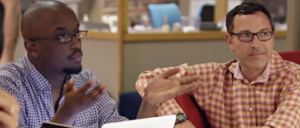
Click here to apply to What’s The Big idea 2018 Now! (Deadline is March 11, 2018.)
The Pitch
Our pitch wasn’t even close to being done, and we had to turn it in by 3 pm on Sunday, about the same time Jason and the financial guys managed to wrap up the financial model. We submit the deck with minutes to spare. A slide has a wrong number. Replace it. Resubmit. I wanted to throw up, but I needed to rehearse the pitch.
KEC had given us some good tips for the finale presentation. Don’t go on stage with note cards. Know your business. Oh, and by the way, if they lose the Apple TV connection to the big screen at Scruffy City Hall and you can’t see your slide deck, just roll with it. HA! Thanks guys! No stress at all!
The pitch finale was at 6 pm, which gave me less than three hours to MEMORIZE a 10-slide deck. Get one person to work with you and get away from the noise.
So I spent the next couple of hours rehearsing the pitch with Michael Bowie, one of our Master Dry mentors and a runner-up from the previous year’s What’s the Big Idea? competition with his Bar Boards business. We had six minutes, and if we went over, they would cut us off. At 5:30, I was still fumbling over details, forgetting the new name of our business in a 10 minute brain fog. I was rattled. I was overthinking. Michael had good advice. You know the story. Tell the story. Hit the main words. You are not memorizing a script. Little things like that.
So at 5:30 pm, we had to move over to Scruffy City Hall to do a stage walk through with the other presenters. I would be third on deck. I was a little green in the gills. Some of my mentors thought I might pass out. So did I. I stepped away for a minute. Gathered my thoughts. Did some breathing.
Six pm. It’s on. The first two presenters were very good, but I noticed a pattern from my background in acting and film that I thought might be useful. I’ve played a homicide detective a few times on Snapped: Killer Couples. So we had a competitive advantage, so to speak. The early presenters were presenting well, but…I wasn’t seeing them really engaging with the audience. One of them had the notecards we were warned about. Some of my nervousness started to subside.
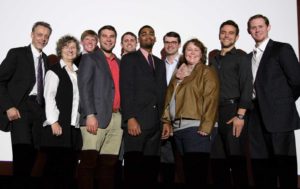
The Problem Story
I got up on stage, and in sharing the Problem Story our team had developed, I think we knocked it out of the park. On the screen were just photos of two farmers. No bullets, no data. Here is the problem story I told from memory, not notes:
Farmer A is a Mennonite farmer. Farmer A loses thousands of pounds of produce every year—unused, unsold produce that could have been sold to a local buyer to support his family.This is Farmer B. Farmer B told us this weekend that he and another farmer split a patch of tomatoes recently, and because of all the time they spent picking a bumper crop, they never had enough time to find markets for their tomatoes. Farmer B admits they probably lost 1500 pounds of tomatoes that could have been sold to local restaurants or grocery stores.Farmer A and Farmer B are not alone.There are over 1.9 million small farmers in the United States, according to the US Department of Agriculture. 68,000 small local farmers in Tennessee alone. There are more than 153 small organic farms in the Knoxville metropolitan area alone.
Some notes about this Problem Story. The farmers had names in the actual pitch. Real photos. We note in this story that we talked to customers this weekend. That’s important. We had data to quantify the size of our market—just in the state of Tennessee, with a nod to the national marketplace by using USDA data. Think global in your business plan, but start local…judges will respect your practicality. Finally, the neat thing about a well-told problem story is that it helps your audience empathize with the customer, and gets them thinking, “how would I solve this problem?”
Which you’re going to hopefully provide in detail on the next slide.
The Ask
I went through the screen shots of our app, explaining functionality, and presented our financials, our market and model, our customer acquisition strategy, and the big thing: The Ask. You want the $10,000 prize. Why? You answer needs to be concrete and specific. Here was ours:
- We’re seeking the $10,000 in reimbursement for marketing and technology development of our prototype platform and acquisition of an additional 15 customers.
- We’re also seeking introductions to business leaders, advisers in the agricultural and restaurant and grocery industries, who can help us plan for additional investment.
Concrete numbers. Acknowledging you need help from the entrepreneurial community. Asking for $10k with a goal of becoming an industry leader is probably not going to work. It’s pretty vague.
Some Acknowledgements
Jason and I just want to add that the support of Knoxville’s entrepreneurial community to business startups is reflected well in programs like the What’s the Big Idea? competition, and we cannot thank KEC, The Development Corporation of Knox County, the Knoxville Chamber of Commerce, and all of the 2016 mentors for their support, guidance and wisdom. There are people in this town who want to help you succeed. Believe it.
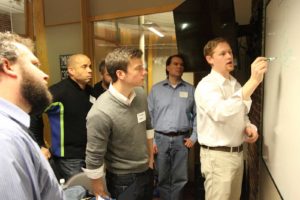
Final Thoughts
Here are a few final thoughts that may hopefully benefit future competitors.
I mentioned audience engagement. During the pitch, in between presenting the details of our business plan, I gave a shout out to some dignitaries in the audience who I knew. I engaged them with some humor, and managed to get some chuckles from the audience. We were pitching a farm app, so I didn’t wear a suit. Jeans and a plaid shirt. Know your audience and your business. Win the room.
Less is more. We packed a lot in out 6-minute pitch. I was literally finishing my last sentence when time was called. It felt silly, because I wasn’t quite done, but I did manage to land on the end of a sentence, so I raised my hands in victory like I’d won, rather than standing there looking like I had run over time. It felt like an episode of Chopped, where you have to put the knives down and step away. Own the stage. Don’t be timid. Walk around like you own the place. Don’t hide behind a microphone. You’ve got nothing to lose and everything to gain.
And then we did win. Every team we competed against deserved to win just as much as we did, and we’ve followed their progress this year, too.
Suddenly, we had a bouncing baby tech startup, and what a year it has been. But that’s a story for another day.
One more note: after your pitch, the judges will do a short Q&A with you. You may know the answers just fine, but know where your mentors are in the audience. If you get stuck on a question, be quick on your feet, and don’t be afraid to say, “That’s a great question! let me ask my financial guy, Bob, to answer that for you.”